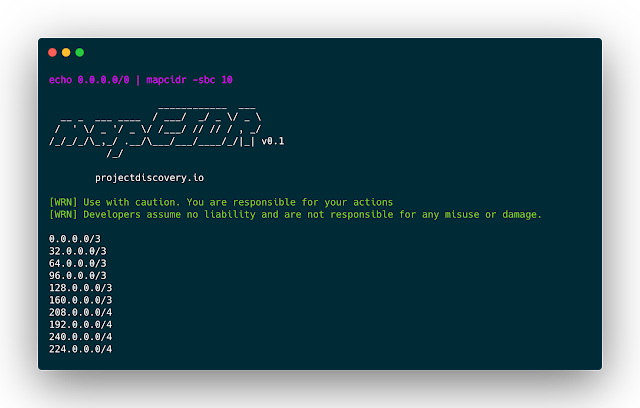Small utility program to perform multiple operations for a given subnet/CIDR ranges.
The tool was developed to ease load distribution for mass scanning operations, it can be used both as a library and as independent CLI tool.
Features
Simple and modular code base making it easy to contribute. CIDR distribution for distributed scanning. Stdin and stdout support for integrating in workflowsInstallation:-
From Source
From Github
Usage:-
This will display help for the tool. Here are all the switches it supports.
| -cidr | Single CIDR to process | mapcidr -cidr 173.0.84.0/24 |
| -sbc | Slice by CIDR count | mapcidr -sbc 10 |
| -sbh | Slice by HOST count | mapcidr -sbh 10000 |
| -l | File containing list of CIDRs | mapcidr -l cidr.txt |
| -o | File to write output to (optional) | mapcidr -o output.txt |
| -silent | Make the output silent | mapcidr -silent |
| -version | Print current version of chaos client | mapcidr -version |
Running mapCIDR
In order to get list of IPs for a give CIDR, use the following command.
▶ echo 173.0.84.0/24 | mapcidr
__ _ ___ ____ / ___/ _/ _ \/ _ \
/ ' \/ _ '/ _ \/ /___/ // // / , _/
/_/_/_/\_,_/ .__/\___/___/____/_/|_| v0.1
/_/
projectdiscovery.io
[WRN] Use with caution. You are responsible for your actions
[WRN] Developers assume no liability and are not responsible for any misuse or damage.
173.0.84.0
173.0.84.1
173.0.84.2
173.0.84.3
173.0.84.4
173.0.84.5
173.0.84.13
173.0.84.14
173.0.84.15
173.0.84.16
Slice by CIDR
In order to slice given CIDR or list of CIDR by CIDR count or slice into multiple and equal smaller subnets, use the following command.
▶ echo 173.0.84.0/24 | mapcidr -sbc 10 -silent
173.0.84.32/27
173.0.84.64/27
173.0.84.96/27
173.0.84.128/27
173.0.84.160/27
173.0.84.208/28
173.0.84.192/28
173.0.84.240/28
173.0.84.224/28
Slice by HOST
In order to slice given CIDR for equal number of host count in each CIDR, use the following command.
▶ echo 173.0.84.0/16 | mapcidr -sbh 20000 -silent
173.0.64.0/18
173.0.128.0/18
173.0.192.0/18
Note: it's possible to obtain a perfect split only when the desired amount of slices or hosts per subnet is a powers of two. Otherwise the tool will attempt to automatically find the best split strategy to obtain the desired outcome.
Use mapCIDR as a library
It's possible to use the library directly in your go programs. The following code snippets outline how to divide a cidr into subnets, and how to divide the same into subnets containing a certain number of hosts
import (
"fmt"
"github.com/projectdiscovery/mapcidr"
)
func main() {
// Divide the CIDR into two subnets
subnets1 := mapcidr.SplitN("192.168.1.0/24", 2)
for _, subnet := range subnets1 {
fmt.Println(subnet)
}
// Divide the CIDR into two subnets containing 128 hosts each
subnets2 := mapcidr.SplitByNumber("192.168.1.0/24", 128)
for _, subnet := range subnets2 {
fmt.Println(subnet)
}
// List all ips in the CIDR
ips, _ := mapcidr.Ips("192.168.1.0/24")
for _, ip := range ips {
fmt.Println(ip)
}
}
mapCDIR is made with by the projectdiscovery team.
.png)
 4 years ago
189
4 years ago
189 
















 Bengali (Bangladesh) ·
Bengali (Bangladesh) ·  English (United States) ·
English (United States) ·